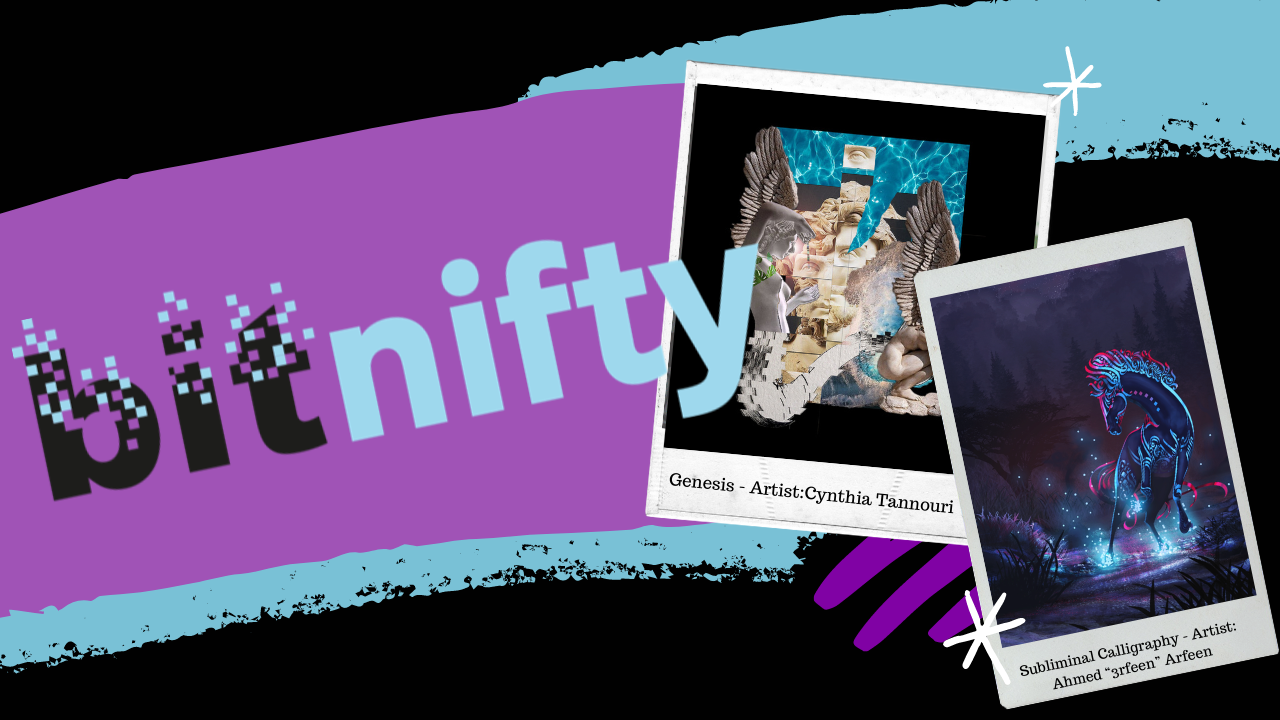
BitNifty: Gifting Artists Financial Empowerment Through NFTs
Written by: Adrian Jimenez Staff Writer UNSUGARCOATED Media
Edited by: Kimberly Henry Senior Staff Writer UNSUGARCOATED Media
June 1,2021
“The Internet was not designed to limit or isolate people or to gatekeep people…it’s all about giving more opportunities to more people…and these people could really, really use it.”

Sleiman Nasr – Co-founder BitNifty
There are lots of ways to help people these days, from volunteering with a local aid group to making donations. But how do we empower people financially? How do we give people the tools they need to be successful? While they don’t claim to have the answers for everyone, Rami-Al-Sabeq and Sleiman Nasr are using their company, BitNifty, to empower Middle Eastern artists and create systemic change through the power of non-fungible tokens (NFTs) and cryptocurrency. Although Nasr was unable to have an interview with us, Al-Sabeq sat down to tell us all about what BitNifty is doing to empower artists in the Middle East.
Making a living as an artist can be a near impossible task, especially when living under unstable conditions. Artists in the Middle East are no exception, according to Al-Sabeq.
“There are no luxury opportunities or artistic opportunities or things that would be considered non-essential…those opportunities are not easy to find in these places,” he says.

Rami Al-Sabeq Co-founder BitNifty
But, with the growing popularity of cryptocurrency and NFTs, Al-Sabeq saw a rare opportunity for artists to rise above their conditions and find opportunities. That’s why he co-founded BitNifty. Through his company, Al-Sabeq connects artists with buyers around the world, turning physical art into digital art.
“[We] approach artists living in tough conditions around the world, sponsor them, commission [their] art, and make that art into NFTs,” explains Al-Sabeq.
But what even is an NFT, and how does Al-Sabeq’s model differ from simply selling art online?
In short, an NFT is a form of blockchain technology that creates a certificate of authenticity, allowing the purchaser to claim ownership of a unique digital file. One of the paramount features of an NFT is the ability to attach it to a “smart contract.” These smart contracts allow artists to receive royalty payments from the resale of their art, thus giving them a continuous income. It’s a new frontier for artists that has the potential to change lives, but artists in the Middle East face a number of obstacles when it comes to making NFTs themselves.
Some Middle-Eastern countries such as Saudi Arabia, Iraq, and Egypt have outlawed cryptocurrency and blockchain technology. While these countries cite concerns for money laundering and tax evasion as reasons for the ban, Al-Sabeq suggests that these fears may not reflect the reality of cryptocurrency.
“Cryptocurrency is actually extremely trackable. Anybody can go into our wallet – BitNifty’s wallet – and see the payments we’ve made. If I have your wallet’s address, I can go into that one,” Al-Sabeq explains. “So, it’s all extremely transparent for everyone to see … whereas cash is not trackable at all.”
Middle Eastern governments’ opposition to cryptocurrency may also have to do with the relative instability of the financial systems of these countries. According to Al-Sabeq, some of these countries have dealt with extreme inflation and corruption in their financial systems for years. Therefore, he suggests these governments see cryptocurrency as a threat to their monetary systems and their control over them.
All this government regulation and economic turmoil has a massive impact on the daily lives of these countries’ citizens, and artists are no exception. Hyperinflation and corruption breed low wages and widespread poverty that limit opportunities for artists that live in these countries.
But how exactly does BitNifty help them?
Take the case of Egyptian artist Ahmed “3rfeen” Arfeen. Currently partnered with BitNifty, Arfeen has three pieces for sale on the NFT website Rarible. As an Egyptian citizen, Arfeen knows the consequence of getting involved with cryptocurrency— a 10-year prison sentence. So, despite the access to buyers that an online NFT sale would provide him, Arfeen could not seek out that opportunity. That’s where BitNifty came in.

Subliminal Calligraphy by Ahmed “3rfeen” Arfeen
Acting as an intermediary, BitNifty commissions Arfeen’s art, and then privately handles the NFT minting and cryptocurrency exchange, simply reimbursing him after the company makes its own sale. Throughout the process, Arfeen has no contact with cryptocurrency that his country has outlawed. Another key to the process, Al-Sabeq says, is the emphasis that BitNifty puts on paying their artists as much as possible.
“We told [Arfeen] that all we take is 15%. … He looked at us like we were crazy – that we should be charging more than just 15%. But we wanted to offer maximum value. It might be that people see [our company] and say, ‘This is too good to be true.’ And this is exactly the reaction we [want] people to have,” Al-Sabeq told us.
This response shapes Al-Sabeq and BitNifty’s mission. Their drive is to help artists access opportunity no matter where they live.
“There are still people there with amazing artistic talent and their art deserves to be out there and have the same treatment as everyone else.”
To learn more about and support BitNifty as it economically empowers artists, follow them on Instagram @bit.nifty or visit their website bitnifty.art.


